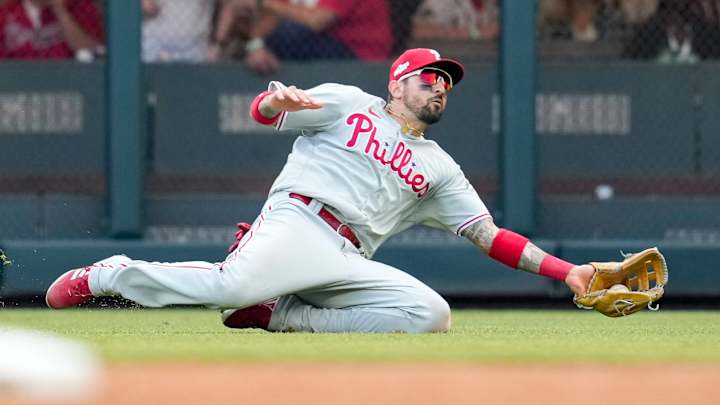Surprise! The Phillies Can Do No Wrong

In this story:
ATLANTA — How does one choose the most surprising part of this game?
Perhaps the honor goes to the Phillies’ offense—a lineup made for slugging that suddenly looked built to manufacture runs. They opened up the scoring with a parade of singles and finished the day without a home run. Bryce Harper had his first sacrifice bunt of the year. Even Kyle Schwarber—yes, that Kyle Schwarber, the one who led the National League in home runs with 46, the one who hasn’t recorded a sac bunt since 2018—showed bunt twice. What’s more surprising than that?
Well, maybe what the afternoon held for Braves starter Max Fried. The ace had lasted at least five innings in all 30 starts he made this year. (Even the one that was cut memorably short with a stomach flu.) But he failed to make it out of the fourth on Tuesday. The lefty has been a beacon of consistency for this rotation, but here, Fried’s fastball was missing a tick and he allowed more runs than he had all season. The two-time Gold Glove winner even had a costly misplay in the field. If anything was more surprising than the Phillies’ offensive approach? It was surely this.
…at least until the afternoon offered a game-saving, heart-stopping gem of a catch from Phillies outfielder Nick Castellanos, who is typically a fielder in name more so than ability. And so the most surprising part of all just may have been that.
All this playing against type led to a 7–6 win for the Phillies to start the NLDS. A style of play the team was used to? Not quite. But that’s Philadelphia’s approach for the postseason: Whatever it takes.
“I think we just have a general philosophy of, ‘You might be asked to do things that you didn’t do all season,’” said Phillies first baseman Rhys Hoskins. “But if we get opportunities, if we get into scoring position, we feel pretty good about that.”
Though, for the record, Philadelphia manager Rob Thomson clarified that no one had been asking for those bunts—and he could perhaps stand to see fewer of them moving forward.
“That’s giving them free rein,” Thomson said of Harper and Schwarber’s bunt attempts. “But for the most part, I would like those guys swinging the bat.”
The Phillies ended up needing every bit of offense they got. They’d built a 7–1 lead with their small-ball approach by the fifth inning. But Atlanta continually threatened—loading the bases yet failing to score in three separate frames—and then finally broke through late to close the gap to one run. The Philadelphia bullpen has been an uneven bunch all year. This game showed that as well as anything. The best Phillies reliever, José Alvarado, had a shutdown performance, and Seranthony Dominguez pitched two strong innings in his longest outing of the season. But elsewhere in the bullpen? There wasn’t nearly as much to compliment. An erratic Connor Brogdon allowed two runs to score. Zack Eflin—who has now been given the ninth in all three games of this postseason run so far—almost blew the whole thing after giving up a three-run shot to Matt Olson. The shaky relief performances ultimately did not cost them the game. But it was a reminder of how few reliable options they have here.
Watch the NLDS with fuboTV. Start your free trial today.
Still, even with questions about the depth of the ‘pen, Philadelphia is in about as good a position as it could have possibly hoped for entering this NLDS. The starters for Games 2 and 3 are co-aces Zack Wheeler and Aaron Nola—a pair who give the team its best possible chance to win with their ability both to flummox hitters and to go deep into games. (That last part is crucial with this bullpen.) The Braves, meanwhile, will have much riding on the health of Spencer Strider. The rookie is the most talented starter on the roster behind Fried—but he’s been out with an oblique injury since Sept. 18, and though he’s on the roster for this series, Atlanta is still unsure of his current ability or what role he might be able to play. Either way, Kyle Wright will start Game 2, but if Strider can slot into the rotation for a crucial Game 3 or 4? That would improve the outlook enormously for Atlanta.
Braves manager Brian Snitker did not elaborate on Strider’s status after Game 1. The pitcher threw a side session on Tuesday, he said, that was “good, felt great.” But he was not ready to announce a start for him. Instead, the only plan the manager would commit to was straightforward.
“We have to win three more games.”
More MLB Coverage:
• Phillies-Braves NLDS Preview: Three Things That Will Decide the Series
• Division Series Predictions: Expert Picks for ALDS and NLDS
• Inside the Mets’ Clubhouse After the End of Another Fruitless Season
• The Biggest Pitching Trends and Oddities of the MLB Postseason
• Joe Musgrove Cl-EAR-ly Wasn’t Cheating

Emma Baccellieri is a staff writer who focuses on baseball and women's sports for Sports Illustrated. She previously wrote for Baseball Prospectus and Deadspin, and has appeared on BBC News, PBS NewsHour and MLB Network. Baccellieri has been honored with multiple awards from the Society of American Baseball Research, including the SABR Analytics Conference Research Award in historical analysis (2022), McFarland-SABR Baseball Research Award (2020) and SABR Analytics Conference Research Award in contemporary commentary (2018). A graduate from Duke University, she’s also a member of the Baseball Writers Association of America.
Follow emmabaccellieri